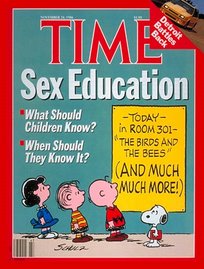













Concern over whether teachers who teach sexualities curriculum are adequately informed enough to assume an ‘expert’ role in the classroom prompted an interesting recent study in the UK. Unfortunately, this survey of 155 sex education teachers in England (94 female, 61 male) suggests that not only do most teachers not have enough knowledge, but only rarely is their teaching in this subject even assessed. Adding to the uneasiness, teachers worry about the possibility of parental complaints, or even worse, litigation. As parents are able to pull their child from sex education at any time, it leaves a residual ambiguity with educators who are unsure about what material must be taught and what is optional.
Assessing sexual health knowledge in this study involved developing a questionnaire designed to measure three components: (i) contraceptive use and methods (i.e. “do you need parental/guardian consent to obtain contraceptives for under 16s/” (ii) sexually transmitted infections (i.e. “can you be unaware that you have a sexually transmitted infection?”) and (iii) about the relationship between contraception and sexually transmitted infections (i.e. “ do all methods of contraception protect you from sexually transmitted infections?” Other parts of the survey listed various medical conditions and asked educators to identify which were STIs, and attempted to measure the level of preparedness teachers felt they had to teach the subject.
Although teachers scored well on general sexual health knowledge, more than half were unable to correctly answer that emergency contraceptive pills are effective for up to three days after unprotected sex, and only 43% could state that the emergency contraception has an effectiveness of 85% if used correctly. Generally speaking, educators do not feel that they have been provided with sufficient information regarding STIs, youth legal rights or contraception. A concerning 73% felt ill-prepared to discuss the availability of local or regional sexual health services that might be available to youth.
Clearly, there is a disconnect between the desired and stated learning goals and outcomes of sexuality curricula, if we are not ensuring that educators are able to teach the material effectively and confidently. Perhaps most telling is that 83% of the teachers involved in the study suggested that they believed that sexualities education should be taught by partnerships involving “teachers, healthcare professionals and other outside agencies” (Westwood & Mullan, 2007, p.151). Providing this scaffolding could radically empower both teachers and youth in the sexualities classroom, and create very different learning opportunities than those that are being quelled through lack of knowledge or confidence.
(source: Westwood, J., & Mullan, B. (2007). Knowledge and attitudes of secondary school teachers regarding sexual health education in England. Sex Education, 7(2), 143-159.)













